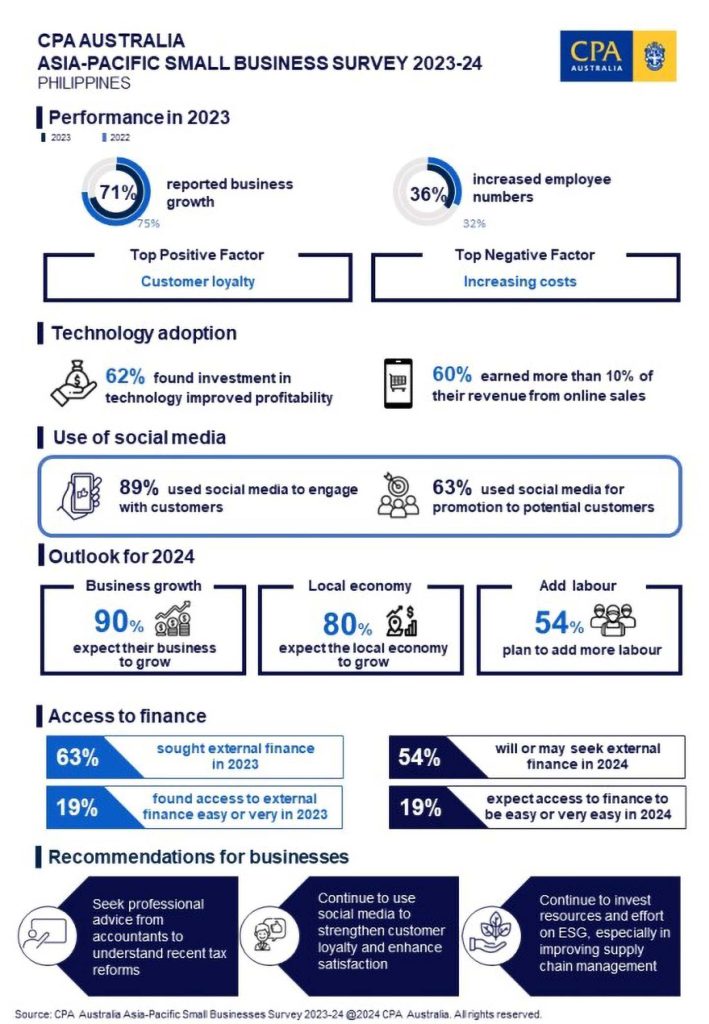MANILA, PHILIPPINES — Nearly 90% of Filipino small businesses expect to see growth in 2024 as the country ranks first among 11 surveyed Asia Pacific markets for the third consecutive year, according to new research conducted by CPA Australia.
CPA Australia’s “Asia Pacific Small Business Survey” collected views from 4,222 small businesses in 11 Asia Pacific markets, including 303 from the Philippines. Despite a small trim in economic growth forecasts earlier this year, small business owners remain positive in the local economy, with eight out of 10 expecting the local economy to grow this year.
“Supported by optimism in the local economy and the strong growth momentum among small businesses, more than half (54%) of Filipino small businesses are planning to add more labor in 2024, the second highest of the surveyed markets,” said Darlow Parazo, a fellow certified practicing accountant (FCPA) of CPA Australia in the Philippines.
“One of the key growth drivers includes increased adoption of technology and the introduction of AI in the business process outsourcing (BPO) industry,” Darlow added.

The survey revealed that 78% of small business owners are aged under 50 years old, and that younger owners are more innovative and keener to embrace technology and the popularity of ecommerce platforms, especially in the retail sector. In fact, 62% of respondent businesses said their investment in technology in 2023 improved their profitability, beating the survey average of 53%.
The research revealed that Filipino small businesses’ strong momentum is highly associated with their focus on customer loyalty, strong customer satisfaction and business strategy. Respondents nominated customer loyalty as the top factor positively influencing their businesses for five conservative years and improved customer satisfaction ranks in the top four factors driving positive influence on businesses in each of the past six years.
An overwhelming majority (89%) of Filipino small businesses used social media last year for various business purposes, such as promotion to potential customers (63%), communication with existing customers (60 per cent), selling products or services (59%), and receiving feedback from customers (42%).
Last year, 68% of small businesses required additional funding, and close to half of these used it for business growth. Nevertheless, only 19% found it “easy” or “very easy” to access external funding, ranked the lowest among the surveyed markets. And they were also the least likely to seek funds from banks compared to their counterparts in the other surveyed markets.
The increasing cost and difficulties accessing external funds may hamper financial returns and development plans, with 46% saying that increased costs negatively affected their businesses last year. The substandard accounting records of many small businesses is likely to be making it more difficult to access external funding. The rise of material costs (50%) remained the cost most felt by local businesses, followed by utilities (42%) and tax (31%).
“Many Filipino micro, small and medium enterprises (MSMEs) are suffering from soaring costs due to the persistence of high inflation caused by strong domestic demand hence the Bangko Sentral ng Pilipinas (BSP) is cautiously considering rate cuts to support economic activity while managing inflation risks. In the next two years, we may see a gradual reduction in interest rates, which is likely to have implications for borrowers and investors in the Philippines SME sector,” said Darlow.
Darlow further added, “The survey shows that tax was a barrier to growth for some Filipino small businesses in 2023. We expect that the recently introduced Ease of Paying Taxes Act should see fewer micro and small business nominate tax as a barrier in future years. Under this Act, business taxpayers are classified as micro, small, medium or large taxpayers based on their gross sales. Micro and small taxpayers now have access to a range of special concessions including a simplified income tax return. MSMEs should consider seeking professional advice from accountants to understand how the changes may impact their business.”
The survey results showed many Filipino small businesses are undertaking activities closely associated with environmental, social and governance (ESG) issues. Many local small businesses are focused on staff health (41%) and supply chain sustainability (38%), a significant increase from 24% last year.
Darlow suggested Filipino MSMEs continue to invest their resources and efforts on ESG, “Sustainable development is an irreversible global trend. Along with the multinational companies’ increasing focus on ESG regulations, MSMEs should seek to better understand their client’s ESG requirements, particularly in relation to supply chain management.”
Learn more about CPA Australia here.









